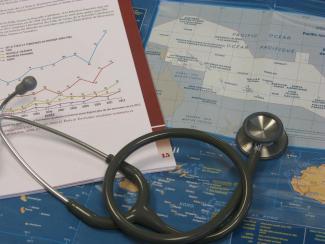
Twenty two Ni-Vanuatu health workers are undertaking another week-long training module on epidemiology in Port-Vila this week (19-24 June).
This is the third of five training modules of the Postgraduate Certificate in Field Epidemiology (PGCFE) programme implemented in Vanuatu by the Pacific Community (SPC).
Epidemiology is a fundamental science of public health that studies the patterns, causes and effects of health conditions in populations.
“The Ministry of Health does not have a qualified epidemiologist at this point in time. Therefore, these trainings are critical in empowering selected health staff with the scientific knowledge and methodology to conduct investigation and problem-solving to get to the root causes of health problems and outbreaks in communities, so that interventions can be undertaken in a timely fashion,” Director of Public Health in Vanuatu, Len Tarivonda, said.
Organised by Vanuatu Ministry of Health and SPC in collaboration with the World Health Organization, this training series aims to produce an epidemiology-skilled Ni-Vanuatu health workforce while helping produce health information system improvements.
“We expect that laboratory staff participating in the training to come out with understanding and skills that will allow and facilitate linkage between laboratory and public health surveillance,” Acting Principal Allied Health Services Manager in Vanuatu, George Junior Pakoa added.
The PGCFE programme builds on the principle “from work, at work, for work” and will address both immediate and long-term challenges and needs that the Pacific health workforce face in their everyday work.
Throughout the PGCFE courses, candidates acquire adequate knowledge and skills to collect, analyse, interpret, communicate and use health data for the purpose of informed decision-making.
Developed by partners of the Pacific Public Health Surveillance Network, the PGCFE programme is well adapted to the Pacific context and accredited by Fiji National University (FNU).
“A great feature of the PGCFE programme is the transfer of knowledge and skills between and among Pacific health workers through partnerships and collaborations,” SPC Acting Team Leader of Surveillance and Operational Research, Onofre Edwin Merilles Jr said.
“We are very happy to have Mindy Sugiyama from Palau Ministry of Health, a former PGCFE candidate who graduated in December 2016, as one of the team of facilitators for the training,” he added.
Two PGCFE modules on public health surveillance and outbreak investigation were delivered in Vanuatu in 2016. A further two modules will be carried out this year, including the one to be delivered this week, with the final module organised for mid-2018.
This initiative is part of the post cyclone Pam recovery activities implemented by SPC Public Health Division with funding support from the German Development Bank (KfW).
Media contact Christelle Lepers, SPC Surveillance Information and Communication Officer, christellel [at] spc.int (christellel[at]spc[dot]int) +678 569 4441
Useful links:
Building outbreak investigation capacity in Vanuatu – October 2016
Scaling up public health surveillance in Vanuatu with data training – August 2016
